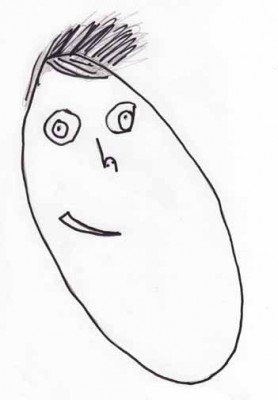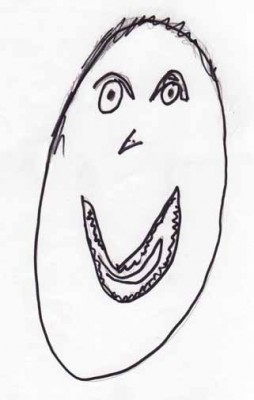

Back to honesty: Unaffected self-portraits
In discussions about art, we babble constantly about “quality” as if it is the determining factor in terms of what is “good” or “bad”. Some say that, for instance, Mozart was a better composer than John Williams could ever be. Or, we might dismiss Norman Rockwell (a mere illustrator) in comparison to, say, a VanGogh. We read a novel, and we nit-pick, saying: Steinbeck is sentimental; Dickens’s plots are too neat. A ballet choreographer might look at kids dancing for change on the street and he might say, “Unsophisticated. That’s not art. It’s ‘pop’ dancing.” But, in the end, what does all of this mean? As I have suggested lots of times, isn’t the measure of art in the way it directly affects us? How important is the “quality” of the work? One can (and I certainly do sometimes) marvel at an artist’s craft, but is great skill necessary for great art? Is skill necessary at all?
That said, I do believe that most of the time great art is, at least in part, the product of excellent skill on the part of the artists. But I also believe that someone who doesn’t know what the hell he or she is doing can come up with something great.
This idea (which is nothing new if you are kind enough to keep up with this column) became, once again, vivid for me as I looked over some artwork done by my first grader’s class: self-portraits. Here, you see very little skill. These are kids, after all, no older than seven. But isn’t the work just plain delightful?
Doesn’t it move you to laugh?
Doesn’t it warm your heart?
Doesn’t it make you grin a wry grin to see a kid’s cheeky impression of himself?
After all is said and done, for me, art exists to communicate the truth about what is inside the artist. It exists to teach us lessons about the human soul that can’t always be put into words.
Maybe we need to judge less and feel more.
You don’t need a master’s degree to make art. You don’t have to have graduated from Pratt or Julliard. You just need to be able to find that thing; that earnestness; that sincerity that draws a line of pure energy from your soul to that of your audience. That’s where artistic magic lies. As you can see above, kids do this without thinking about it. When we grow up, we think ourselves out of being honest sometimes — mostly as a result of self-consciousness.
As a songwriter, I used to be constantly aware of how much “cooler” other writers seemed compared to me. (Not in terms of their personalities but in terms of their work. In general, I’m, like, the coolest guy ever.) For a while, I tried to write hip; I lamented my Romantic approach — my love of melody and, well, beauty. Not until very recently (maybe as a result of coming to grips with being an artistic nobody who is likely to remain so) did I learn to just be honest. If I’m not cool, I’m not cool. But I’m not going to lie.
There are so many times in life when we look at children and lament what we have lost since the days on the swing-set. But not all of it is lost beyond hope. If we shed the layers of self-consciousness, the inner child, cliched as it may seem, is just waiting to shine through.
Chris Matarazzo’s ARTISTIC UNKNOWNS appears every Tuesday.
Latest posts by Chris Matarazzo (Posts)
- Book Review: An Encyclopedia of Tolkien - October 14, 2019
- The Emperor decrees an end to positive comments about “selfies” - June 16, 2015
- The Emperor decrees that graduation clichés will cease - June 9, 2015
- The Emperor decrees that all official documents will be printed in Comic Sans - March 24, 2015
- The Emperor decrees that the letter “E” shall no longer be spoken as an “A” - February 10, 2015
 Print This Post
Print This Post







Discussion Area - Leave a Comment